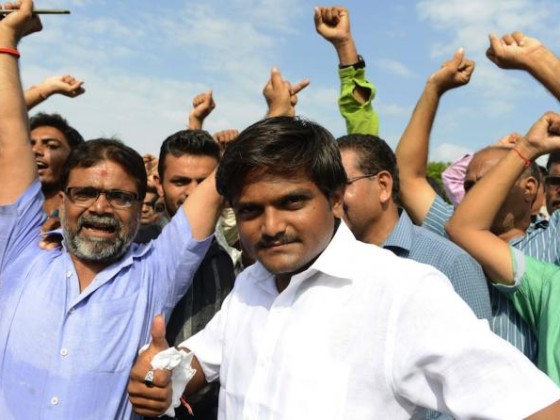NEW DELHI, India — India’s caste system discriminates against millions who were not born into the “right” families, but now, the privileged castes are clamoring to be counted among the government’s “backward classes” category. One community is so eager to be recognized as backward that they are turning out en masse to agitate against the government.


Why Rich Indian Landowners Are Rioting to Be Seen as Oppressed
The Patel community is native to the state of Gujarat, but the name is easily recognizable outside the country as one of the largest Indian groups to have migrated to the US and UK. In India, Patels have historically been landowners. Over time, they have come to dominate the state’s politics and establish the largest diamond, ceramics and pharmaceutical businesses in Gujarat.
Last week, Patel protesters brought their demands to an event by India’s Prime Minister Narendra Modi in New York. When Modi was speaking on sustainable prosperity and global partnerships at the United Nations, a group of American Patels — of whom there are 150,000 — stood outside with placards demanding the state of Gujarat extend affirmative action benefits to their community.
Last month, 22-year-old Hardik Patel, a local organizer, mobilized half a million people to demand their inclusion in the “Other Backward Classes” category, identified by state governments as socially and economically disadvantaged groups that receive officially-mandated preferential treatment. Affirmative action policies across India set aside 27 percent of seats in government jobs and institutes of higher learning for “backwards” groups, allowing them to qualify for competitive positions with lower scores than the overall cutoff.
The government recognizes two other reserved categories, the Scheduled Castes who have been historically discriminated against for being “lower” castes, such as the once so-called “Untouchables,” and the Scheduled Tribes who have been politically and socially excluded. All together, these three groups can have a maximum of 50 percent of government or university seats reserved for them, and the Patels are demanding a share of this pie.
“If you do not give us our right, we will snatch it,” said Hardik at the August 25 rally. His group demands inclusion or the abolishment of preferential quotas for groups. Ten people were killed in the police crackdown on protestors that broke out after the rally, and the army was called in. Last week, when Hardik was detained for holding a rally without permission, the state police suspended mobile internet services in Gujarat’s major cities.
Already, one twenty-something’s fancies are finding resonance across the country, and the world. Patels have mobilized in other Indian states as well, and groups without quotas in Haryana and Uttar Pradesh have restarted their own campaigns for special benefits. Demands to abolish or reconsider quotas altogether have also resurfaced, with prominent right wing leader Mohan Bhagwat calling for a revision of affirmative action policy in the country.
A protest rally was also planned outside the United Nations last Friday, and later during Modi’s visit to San Jose.
“We are fighting for our poor brethren back home,” Alpesh Patel, a US Patel group leader, told the Indian Express. He claimed that the Patels were being deprived of work and education opportunities in India because of preferential treatment for others. “You must remember that only because of the reservation system in India, more than 10,000 Patel engineers and doctors are in America today.”
Indian media believes that these threats to protest during a significant state tour by the prime minister are what finally forced the government’s hand. Though the state government has so far refused to give in to Patel demands, arguing that changes to the constitution must be made by due process, on Sept. 24 they announced a $150 million package to support the education of impoverished people of all castes in Gujarat. While the other Patel groups seem placated for now, Hardik, predictably, is unhappy. He has started a “lollipop movement” in Gujarat, proposing to hand out candy to Patels to imitate the government’s ineffective effort to placate the community with the package.
The movement has also spawned an opposition group from those who receive government benefits, who are peacefully campaigning against the Patel claims. As the current percentage of spots reserved for these groups has already reached its cap, any additional reserved communities would increase competition for the same number of seats.
“Their children study in air conditioned classes, hire private tutors for every subject. Our people aren’t sure of getting two meals a day, they don’t have clothes or electricity. How can our children compete?” said Alpesh Thakor, the president of a group founded in direct opposition to the Patel protests.
He said the group would welcome the Patels if the government found that they were in fact economically and socially backward, but the more likely reason behind the agitation is that higher castes do not want the established social order to be disturbed. “They want the labourer’s son to stay a labourer, and the master’s son to stay a master,” he said.
Regardless of protests, votes may ultimately be the best defense of affirmative action policies in India.
“Reservations are here to stay, they are not going anywhere,” said Vidhu Verma, a political studies professor at Jawaharlal Nehru University. “There is a political constituency involved, no government which [revokes reservations] can come back to power.”
By Nimisha Jaiswal, GlobalPost
This article is syndicated from GlobalPost.